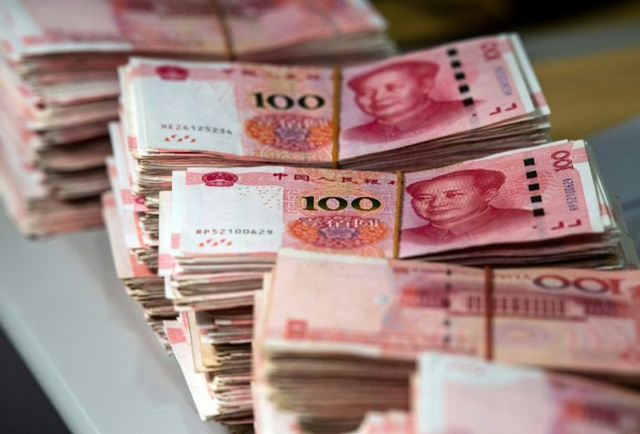
Shanghai, China | AFP | China’s yuan has sunk by around four percent in August to its lowest point in more than 11 years on Monday, a decline likely to further exacerbate trade tensions with Washington.
Here are five things to know about the yuan’s slide:
– Why has the yuan depreciated?
Because China is allowing it to.
China limits the yuan’s daily fluctuations against the dollar by setting a daily benchmark rate and allowing the unit to trade within a two percent range on either side of that.
This is aimed at balancing actual forex market trends with the need to guard against the precipitous swings that can occur in China’s immature capital markets.
But China has steadily set the rate at a weaker point in recent weeks — and apparently stopped using its foreign exchange reserves to prop up the yuan — as the trade war with Washington has turned increasingly hostile.
– What does China get out of this?
A weaker yuan cushions the blow of US President Donald Trump’s escalating trade tariffs, imposed beginning last year to pressure China to change what Washington considers unfair trade practices.
The US has slapped tariffs on vast amounts of Chinese goods, which makes them more expensive and thus less attractive to US buyers. A weaker yuan, however, means those same goods can be sold at lower prices, ameliorating some of the tariff impact.
China’s economy was already slowing considerably before the trade war, and policymakers in Beijing are keen to prevent a further economic blow arising from a tariff-crippled manufacturing sector.
– What are the risks for China, and the world?
For China, a Twitter tirade is a fairly good bet.
China critics in the United States have long accused Beijing of holding the yuan below market value to gain an export edge, and an even weaker yuan is likely to add fuel to that.
Trump earlier this month had already angrily accused Beijing of weaponising the yuan after it slipped past the key level of 7.0 to the dollar, which also prompted his administration to label China a “currency manipulator”, which could trigger more retaliatory measures.
If not managed properly, a continued yuan slide could also undermine investor confidence in China’s economy, triggering a flight of capital out of yuan-based assets.
But it raises the risk of global turmoil as well, by placing pressure on other emerging-market countries to devalue their own currencies to stay export-competitive.
– Why would China risk escalating things?
With China-US relations seemingly in an inevitable death spiral, Beijing may be calculating that it has nothing to lose from letting the yuan fall.
Earlier this month, Capital Economics said in a research note that China “appears to have decided that, given the increasingly dim prospects of a trade deal with the US, the boost to China’s export sector from currency depreciation is worth attracting the ire of Trump”.
China also expends vast amounts of its huge forex reserves to prop up the yuan in order to head off US charges that the currency is artificially weak. By refraining from that, and letting the yuan move in line with downward market pressures, China preserves its forex hoard.
– Where will this end?
With no resolution of the trade war in sight, analysts expect the yuan to continue to soften as China uses a weaker yuan and domestic stimulus measures to weather the trade war.
UBS banking group predicts the yuan, which weakened to 7.14 to the dollar on Monday, could decline to 7.2 by the year-end and to 7.3 by the end of 2020.
Capital Economics, on the other hand, predicts it will hit 7.30 by end-2019 and 7.50 next year.
 The Independent Uganda: You get the Truth we Pay the Price
The Independent Uganda: You get the Truth we Pay the Price



